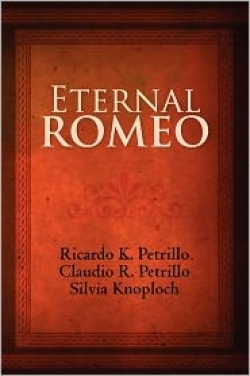It looks like you've stumbled upon a page meant to be read by our code instead of viewed directly. You're probably looking for this page.
Eternal Romeo
The mid-nineteenth century saw the rise of Spiritualism, a religion which taught that people could communicate and interact with spirits in the afterlife. Practitioners participated in activities such as séances and card readings to contact the spirit world. One of the activities many Spiritualists followed was automatic writing, a process whereby a person enters a trance and begins writing. In this process, however, the person holding the pen or pencil is not composing their own thoughts, but is dictating the words of a spirit.
It’s this process that produced the book of poetry, Eternal Romeo. The author, Ricardo Petrillo, died from a fall in 2005 but has contacted his parents, Claudio R. Petrillo and Silvia Knoploch, from the beyond with verse. Since Ricardo’s first contact, his parents have compiled four books of poetry.
While the previous volumes focused on spirituality and love, Petrillo’s latest work takes a more dramatic, epic approach. The poems are divided into acts and scenes. The first section, called “Rehearsals,” follows the tale of a nameless London-wandering poet, a Dante-in-the-Inferno-type character who is shown visions of the afterlife and is inspired to write. The first act looks at Hamilcar and his son Hannibal, while the rest of the acts focus on Romeo; his life and death as they happen in Romeo and Juliet, his past lives, and then his future lives.
For readers who are unfamiliar with Shakespeare’s play, Romeo and Juliet, Petrillo’s take is an excellent introduction. Readers who have seen or read the play will find its adaptation to epic poetry fits well. So well, in fact, it’s surprising that no one has thought of it before. For example, when Romeo first visits Friar Lawrence to ask him to marry him and Juliet, Petrillo writes: “Romeo was barely listening / To the wisdom of the friar / While dancing around him / In his innocent dance of love.”
The real beauty of this collection of poems is its hopefulness. Even though Petrillo is talking of love as Romeo, there is a purity and belief behind it. This is not passionate or frivolous human love; it is love that truly endures all. “Love, so great it was / Calm and serene / Without the fire of passion / And the torment of possession,” Petrillo writes.
No matter what readers think of the circumstances under which this book was written, Eternal Romeo is a mesmerizing read for anyone who loves poetry and the belief that love goes on.
Reviewed by
Katerie Prior
Disclosure: This article is not an endorsement, but a review. The publisher of this book provided free copies of the book and paid a small fee to have their book reviewed by a professional reviewer. Foreword Reviews and Clarion Reviews make no guarantee that the publisher will receive a positive review. Foreword Magazine, Inc. is disclosing this in accordance with the Federal Trade Commission’s 16 CFR, Part 255.
